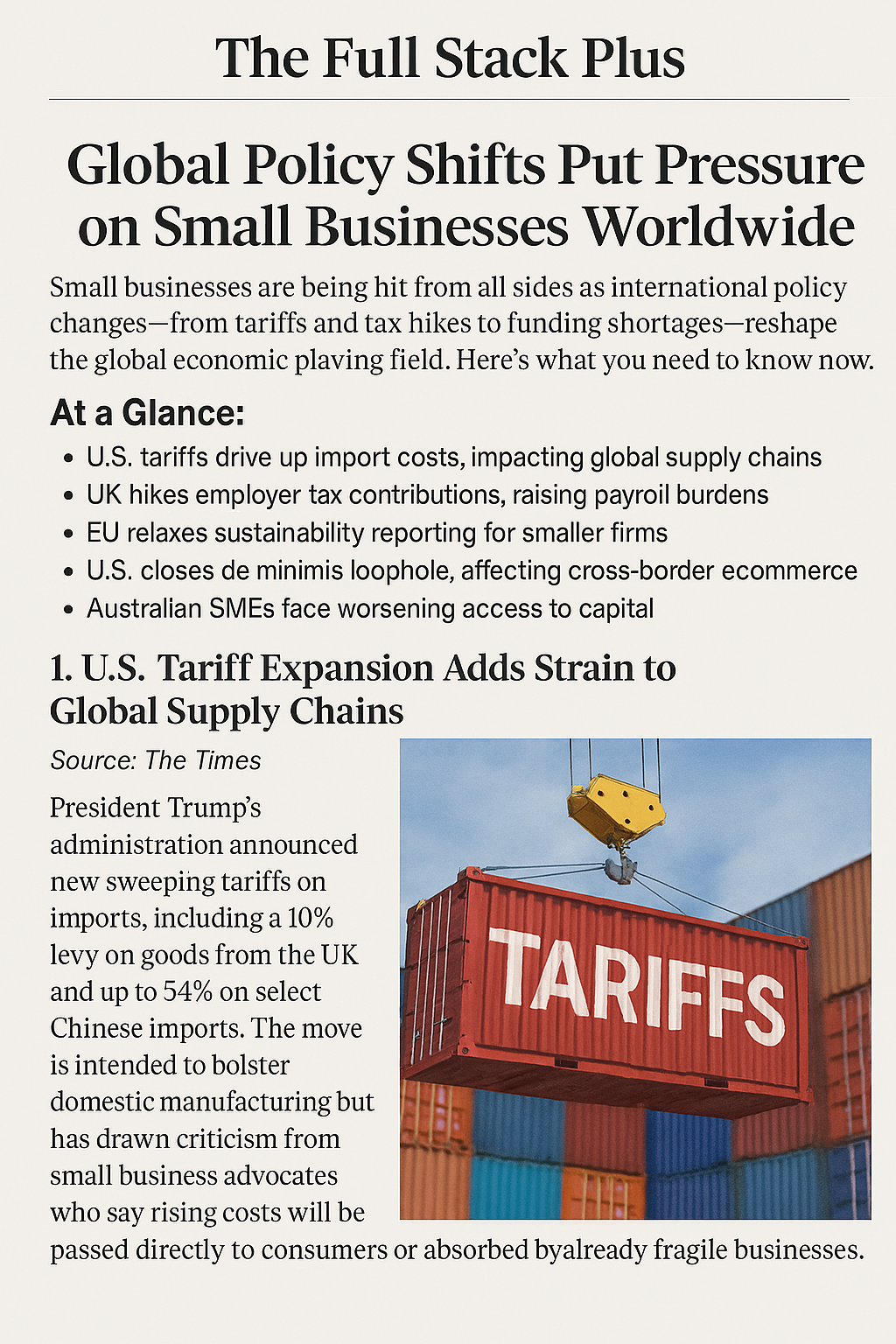
Small businesses are being hit from all sides as international policy changes—from tariffs and tax hikes to funding shortages—reshape the global economic playing field. Here's what you need to know now.
At a Glance:
- U.S. tariffs drive up import costs, impacting global supply chains
- UK hikes employer tax contributions, raising payroll burdens
- EU relaxes sustainability reporting for smaller firms
- U.S. closes de minimis loophole, affecting cross-border e-commerce
- Australian SMEs face worsening access to capital
1. U.S. Tariff Expansion Adds Strain to Global Supply Chains
Source: The Times
President Trump’s administration announced new sweeping tariffs on imports, including a 10% levy on goods from the UK and up to 54% on select Chinese imports. The move is intended to bolster domestic manufacturing but has drawn criticism from small business advocates who say rising costs will be passed directly to consumers or absorbed by already fragile businesses.
Impact:
Small businesses that depend on imported goods—from electronics and apparel to raw materials—will face higher costs and supply delays. Many may have to adjust pricing, reduce margins, or find alternative suppliers to remain competitive.
2. UK Hikes Employer National Insurance Contributions
Source: Enterprise Nation
As of April 6, 2025, UK businesses must pay 15% in National Insurance contributions, up from 13.8%. This tax hike is part of the government's broader fiscal plan to stabilize public spending post-pandemic, but it has sparked concern among small business owners.
Impact:
The additional payroll burden could force small companies to freeze hiring, cut staff hours, or reduce wages. It also undermines efforts to boost employment during an already fragile recovery period.
3. EU Slashes Sustainability Reporting Requirements
Source: Vogue Business
In a significant shift, the European Commission’s Omnibus Simplification Package aims to reduce sustainability reporting obligations for small businesses by 80%. This change follows concerns that compliance with the Corporate Sustainability Reporting Directive (CSRD) was too demanding for micro and small enterprises.
Impact:
This move will likely ease administrative strain on small businesses and reduce compliance costs. However, it may also create challenges for companies that want to demonstrate ESG leadership but lack standardized frameworks.
4. U.S. Closes De Minimis Loophole for Imports
Source: Vogue Business
Effective May 2, 2025, the U.S. government will end the de minimis exemption, which allowed goods valued under $800 to enter the country duty-free. This will particularly affect small international e-commerce brands and drop shippers, many operating on thin margins.
Impact:
Small businesses outside the U.S. selling to American consumers could see order volumes drop due to higher landed costs. U.S.-based sellers may benefit from the more level playing field, but consumers may pay more overall.
5. Australian Small Businesses Struggle to Access Capital
Source: Mortgage Business
Many Australian SMEs report increasing difficulties securing loans or equity investments in 2025. Due to lingering economic uncertainty, banks and lenders remain cautious despite stable interest rates, leaving small businesses with limited options to fund operations or scale.
Impact:
Without access to capital, many small firms may delay growth plans, miss out on new opportunities, or struggle with cash flow. This trend could result in a slowdown in the broader economy and rising business closures.
WBN News Team
Tags: #Global Economy #Small Business News #Tariff Impact #SME Challenges #Business Policy #2025 Economy
